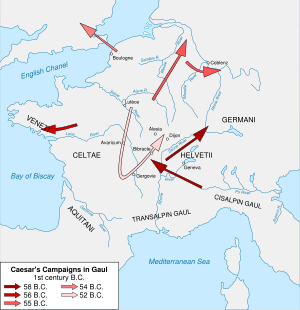58 BC
Year 58 BC was a year of the pre-Julian Roman calendar. At the time, it was known as the Year of the Consulship of Piso and Gabinius (or, less frequently, year 696 Ab urbe condita). The denomination 58 BC for this year has been used since the early medieval period, when the Anno Domini calendar era became the prevalent method in Europe for naming years.
| Millennium: | 1st millennium BC |
|---|---|
| Centuries: | |
| Decades: | |
| Years: |
| 58 BC by topic |
| Politics |
|---|
| Categories |
|
| Gregorian calendar | 58 BC LVII BC |
| Ab urbe condita | 696 |
| Ancient Egypt era | XXXIII dynasty, 266 |
| - Pharaoh | Ptolemy XII Auletes, 23 |
| Ancient Greek era | 180th Olympiad, year 3 |
| Assyrian calendar | 4693 |
| Balinese saka calendar | N/A |
| Bengali calendar | −650 |
| Berber calendar | 893 |
| Buddhist calendar | 487 |
| Burmese calendar | −695 |
| Byzantine calendar | 5451–5452 |
| Chinese calendar | 壬戌年 (Water Dog) 2639 or 2579 — to — 癸亥年 (Water Pig) 2640 or 2580 |
| Coptic calendar | −341 – −340 |
| Discordian calendar | 1109 |
| Ethiopian calendar | −65 – −64 |
| Hebrew calendar | 3703–3704 |
| Hindu calendars | |
| - Vikram Samvat | −1 – 0 |
| - Shaka Samvat | N/A |
| - Kali Yuga | 3043–3044 |
| Holocene calendar | 9943 |
| Iranian calendar | 679 BP – 678 BP |
| Islamic calendar | 700 BH – 699 BH |
| Javanese calendar | N/A |
| Julian calendar | N/A |
| Korean calendar | 2276 |
| Minguo calendar | 1969 before ROC 民前1969年 |
| Nanakshahi calendar | −1525 |
| Seleucid era | 254/255 AG |
| Thai solar calendar | 485–486 |
| Tibetan calendar | 阳水狗年 (male Water-Dog) 69 or −312 or −1084 — to — 阴水猪年 (female Water-Pig) 70 or −311 or −1083 |

Map of the Gallic Wars (58–50 BC)
Events
By place
Roman Republic
- Consuls: Lucius Calpurnius Piso Caesoninus and Aulus Gabinius.
- Publius Clodius Pulcher, Roman tribune, institutes a monthly corn dole for poor Romans, and exiles Cicero from the city.
- Cyprus becomes a Roman province.
- First year of Julius Caesar's Gallic Wars:
- Julius Caesar becomes a provincial governor (proconsul) and leads a Roman army (6 Roman legions; Legio VII, Legio VIII, Legio IX, Legio X, and newly levied Legio XI and Legio XII) into Gaul.[1] He deploys auxiliaries as part of this army, including Balearic slingers, Numidian and Cretan archers,[2] and Celtic/Gallic cavalry (such as the allied Aedui[3]).
- Caesar builds a 19-mile earthwork, complete with fortifications and watchtowers, between Lake Geneva and the Jura Mountains.[4]
- June – Caesar defeats the migrating Helvetii in the Battle of the Arar (Saône).[5]
- July – Caesar decisively defeats the Helvetii in the Battle of Bibracte.[6]
- September – Caesar decisively defeats the Suebi led by King Ariovistus in the Battle of Vosges.[7]
- Winter – Caesar leaves his legions in winter quarters among the Sequani (located in modern-day Burgundy) far to the north of the formal boundary of Gallia Transalpina. He returns to Gallia Cisalpina, carrying out judicial and administrative activities.[8]
Egypt
- Berenice IV becomes queen of Egypt after temporarily dethroning her father, King Ptolemy XII Auletes.
Births
- Jumong (King Dongmyeong), king of Goguryeo (d. AD 19)
- Livia, second wife of Augustus Caesar (d. AD 29)
Deaths
- Go Museo Dangun, 6th ruler of Buyeo (Korea)
- Ptolemy of Cyprus, last Hellenistic king of Cyprus
gollark: Guess I'll just obliterate everything within 50 metres of your base then.
gollark: Well, if I don't want to spend at least 3 time joining, I need to know the coordinates a priori.
gollark: <@151391317740486657> Coordinates?
gollark: Don't worry; I have a potatOS computer hooked up to our construction system, I can schedule demolition remotely.
gollark: Fascinating!
References
- "De Bello Gallico" and Other Commentaries by Julius Caesar, Book1. pp. 1.7, 1.8, 1.10. Archived from the original on January 11, 2011.
- "Caesar's Commentaries on the Gallic and Civil Wars: with the Supplementary Books attributed to Hirtius. Book Two". January 11, 2011. p. 2.7, 2.10, 2.19, 2.24. Archived from the original on January 11, 2011. Retrieved December 29, 2017.
- "Caesar's Commentaries on the Gallic and Civil Wars: with the Supplementary Books attributed to Hirtius". January 11, 2011. p. 1.15. Archived from the original on January 11, 2011. Retrieved December 29, 2017.
- "Caesar's Commentaries on the Gallic and Civil Wars: with the Supplementary Books attributed to Hirtius". January 11, 2011. p. 1.8. Archived from the original on January 11, 2011. Retrieved December 29, 2017.
- "Caesar's Commentaries on the Gallic and Civil Wars: with the Supplementary Books attributed to Hirtius". January 11, 2011. p. 1.12. Archived from the original on January 11, 2011. Retrieved December 29, 2017.
- "Caesar's Commentaries on the Gallic and Civil Wars: with the Supplementary Books attributed to Hirtius". January 11, 2011. pp. 1.21–1.30. Archived from the original on January 11, 2011. Retrieved December 29, 2017.
- "Caesar's Commentaries on the Gallic and Civil Wars: with the Supplementary Books attributed to Hirtius". January 11, 2011. pp. 1.31–1.54. Archived from the original on January 11, 2011. Retrieved December 29, 2017.
- Nic Fields (2014). Alesia 52 BC: The final struggle for Gaul, p. 13. ISBN 978-1-78200-922-1.
This article is issued from Wikipedia. The text is licensed under Creative Commons - Attribution - Sharealike. Additional terms may apply for the media files.